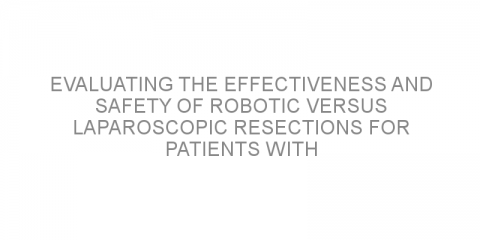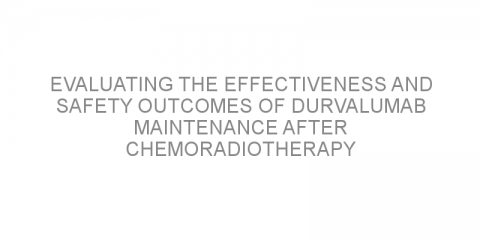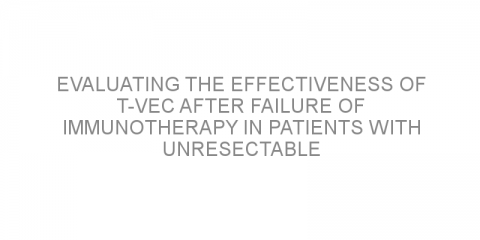In a nutshell This study evaluated the effectiveness and safety outcomes of cemiplimab (Libtayo) plus chemotherapy as first-line treatment in patients with advanced non-small cell lung cancer (NSCLC). The data showed that cemiplimab plus chemotherapy as first-line treatment was effective with manageable side effects in these patients. Some...
Read MoreCurrent stage?-Stage III Posts on Medivizor
Evaluating the effectiveness and safety of robotic versus laparoscopic resections for patients with low rectal cancer.
In a nutshell This study evaluated the effectiveness and safety of robotic versus laparoscopic abdominoperineal resections (APRs) for the treatment of patients with low rectal cancer (RC). The data showed that robotic APRs significantly reduced surgical trauma and promoted recovery after surgery compared with laparoscopic APRs in these patients. Some...
Read MoreEvaluating the long-term effectiveness and safety of 3-month versus 6-month modified FOLFOX/CAPOX treatment after surgery in patients with stage 3 colon cancer.
In a nutshell This study evaluated the long-term effectiveness and safety of 3-month versus 6-month modified FOLFOX (5-fluorouracil, leucovorin, and oxaliplatin) or CAPOX (capecitabine and oxaliplatin) treatment after surgery in patients with stage 3 colon cancer. The data showed that 3-month modified FOLFOX/CAPOX treatment was as effective and safe as...
Read MoreAdding pembrolizumab before and after surgery for early triple-negative breast cancer
In a nutshell This study aimed to investigate pembrolizumab (Keytruda) before and after surgery in patients with early triple-negative breast cancer (TNBC). This study concluded that the addition of pembrolizumab to chemotherapy before surgery and after surgery for TNBC improved the survival without complications from TNBC in these...
Read MoreEvaluating the long-term effectiveness and safety of adding carboplatin with or without veliparib to standard chemotherapy given before surgery in patients with triple‑negative breast cancer.
In a nutshell This study reported the long-term effectiveness and safety of adding carboplatin (Paraplatin) with or without veliparib (ABT-888) to standard chemotherapy given before surgery (neoadjuvant chemotherapy; NACT) in patients with early-stage triple-negative breast cancer (TNBC). The data showed that the addition of carboplatin to standard NACT...
Read MoreEvaluating the risk factors associated with radiation skin irritation after radiotherapy in patients with breast cancer
In a nutshell This study evaluated the risk factors associated with acute radiation dermatitis (ARD; skin irritation) after radiotherapy (RT) in patients with breast cancer (BC). The data showed that patients with diabetes, smokers, and those with a body mass index (BMI; a measure of body weight in relation to height) of more than 25 kg/m2 had a...
Read MoreCan osimertinib be used as first-line therapy in older patients with EGFR-mutated NSCLC?
In a nutshell This study evaluated the effectiveness and safety of osimertinib (Tagrisso) as first-line therapy for older patients above 75 years with epidermal growth factor receptor (EGFR)-mutated non-small-cell lung cancer (NSCLC). The data showed that osimertinib as first-line therapy is effective in these patients. However, osimertinib was...
Read MoreAdding dalpiciclib to fulvestrant in patients with hormone receptor-positive and HER2-negative advanced breast cancer
In a nutshell This study investigated the effectiveness and safety of dalpiciclib (SHR6390) plus fulvestrant (Faslodex) in patients with hormone receptor-positive (HR+) and HER2-negative (HER2-) advanced breast cancer (BC). The data showed that adding dalpiciclib to fulvestrant was safe and significantly improved the survival without cancer worsening in...
Read MoreEvaluating the effectiveness and safety outcomes of durvalumab maintenance after chemoradiotherapy for unresectable stage 3 non-small-cell lung cancer.
In a nutshell This study evaluated the effectiveness and safety outcomes of durvalumab (Imfinzi) maintenance after chemoradiotherapy (CRT) in real-world patients with unresectable stage 3 non-small-cell lung cancer (NSCLC). The data showed that durvalumab maintenance after CRT was safe and showed good short-term survival outcomes in these...
Read MoreEvaluating the effectiveness of T-VEC after failure of immunotherapy in patients with unresectable metastatic melanoma.
In a nutshell This study evaluated the effectiveness of talimogene laherparepvec (Imlygic; T-VEC) after failure of immunotherapy for the treatment of patients with unresectable metastatic melanoma. The data showed that T-VEC after the failure of immunotherapy is safe and effective in these patients. Some background Melanoma is an aggressive type of...
Read MoreEvaluating the outcomes of current therapies after surgery for patients with stage III melanoma who did not undergo complete lymph node dissection.
In a nutshell This study evaluated the outcomes of immune and molecular targeted therapies after surgery for patients with stage III melanoma who did not undergo complete lymph node dissection. The data showed that the immune and targeted therapies after surgery were associated with increased survival without metastasis among these patients. Some...
Read MoreEvaluating the effectiveness of extended robot-assisted prostate surgery and extended pelvic lymph node dissection in patients with very high-risk prostate cancer.
In a nutshell This study analyzed the effectiveness of extended robotic-assisted laparoscopic prostatectomy (eRALP) with extended pelvic lymph node dissection (ePLND) without any other additional treatments for patients with very-high-risk localized prostate cancer (PCa). The study found that eRALP with ePLND alone was safe and effective...
Read More














